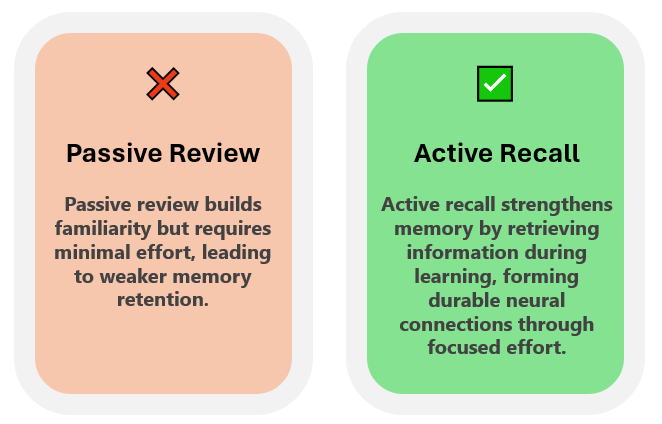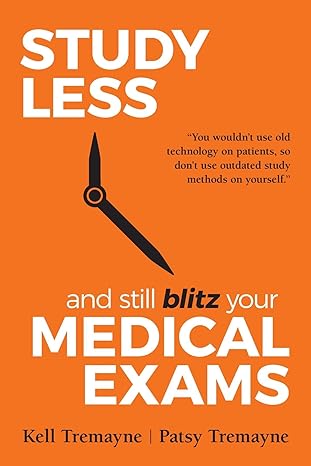- Home
- From Doctor Burnout to Resilient Recovery
- Active Recall Study Method
Active Recall Study Method for Doctors: Learn Smarter, Retain Longer
The active recall study method is a learning strategy that involves actively retrieving information from memory—without referring to notes or textbooks—rather than passively reviewing it. It’s the difference between reading a page and then closing the book to ask, “What did I just learn?”
This simple shift dramatically improves how your brain stores and strengthens knowledge. Unlike passive methods like rereading, highlighting, or watching videos, the active recall study method forces your brain to work harder. That effort is what makes it so effective.
It’s not always comfortable—but it’s consistently shown to be one of the most efficient ways to learn and retain information, especially in demanding fields like medicine, where the volume of content and pressure to perform are both high.
Why the Active Recall Study Method Works
When you retrieve information from memory, you reinforce the neural pathways that store that knowledge. Each time you recall a fact, concept, or process, you strengthen your ability to access it again—especially under pressure, like in exams or clinical settings.
The active recall study method also helps you identify gaps in your understanding. If you can’t recall something, it’s a signal to revisit and reinforce that area. Over time, this leads to:
- Deeper learning
- Better long-term retention
- More confidence in applying knowledge
In short: retrieval is learning. The more you do it, the stronger your memory becomes.

Active Recall vs. Passive Review
Most students default to passive review: rereading notes, highlighting textbooks, or watching lectures again. These methods feel productive—but they’re deceptive. They create a sense of familiarity, not mastery.
Active recall, by contrast, is effortful. It feels harder because it is harder—but that’s exactly why it works. You’re training your brain to do the thing you’ll need to do in the exam: retrieve information without prompts.
In our book Study Less and Still Blitz Your Medical Exams, we describe how Pedro, a basic physician trainee, failed his written exams despite long hours of passive study. After switching to active recall—writing questions, testing himself, and reviewing his answers—he passed with confidence. His study time decreased, but his results improved.

How to Use The Active Recall Study Method
1. Turn Notes into Questions
Instead of summarising a topic, write questions that test your understanding. For example:
- ❌ “The causes of hyperkalaemia include…”
- ✅ “What are the top five causes of hyperkalaemia in adults?”
This forces you to retrieve the answer, not just recognise it.
2. Use Flashcards (Properly)
Flashcards are a classic active recall tool—but only if used correctly. Don’t just flip through them. Look at the question, try to answer it from memory, then check your response. Apps like Anki use spaced repetition to schedule reviews at optimal intervals.
3. Self-Quiz After Every Study Session
At the end of each study block, close your notes and write down everything you remember. Then check for accuracy. This “brain dump” technique is simple but powerful.
Consider also pre-testing prior to study - it is a great way to study more effectively.
4. Teach It Out Loud
Explaining a concept aloud—as if teaching a junior colleague—forces you to retrieve and organize your thoughts. If you can’t explain it clearly, you probably don’t understand it well enough yet.
Consider combining this technique with deliberate practice for increased retention.
5. Use the Double-Take Method
Record yourself answering a question. First, listen for content: did you cover the key points? Then listen again for tone: did you sound confident and clear? This method, described in our book, helps you refine both your knowledge and your delivery.
Real-World Example: Aisha’s Active Recall Strategy
Aisha, a final-year medical student preparing for her clinical OSCEs and written exams, developed a dynamic active recall routine that fit her busy hospital schedule:
- Daily Case Review Questions
After each clinical rotation, Aisha wrote 3–4 questions based on real patient cases she encountered. For example:
✅ “What are the key diagnostic criteria for nephrotic syndrome in children?”
✅ “How do you differentiate between Crohn’s disease and ulcerative colitis clinically?” - Weekly Peer Teaching Sessions
Every Sunday, she met with two peers and took turns teaching topics aloud. They quizzed each other and corrected misunderstandings in real time. - Voice Notes on the Go
During commutes, Aisha recorded herself answering questions and listened back later, noting areas where she hesitated or missed key points. - Error Log and Review Blocks
She kept a digital “error log” in Notion, tagging topics she struggled with. Each week, she dedicated one study block to revisiting these weak areas using flashcards and mini-quizzes. - Mock OSCE Practice
Once a fortnight, she simulated OSCE stations with a friend, using active recall to answer clinical scenarios under timed conditions.
This approach helped Aisha stay engaged, reinforce her clinical reasoning, and build confidence for both practical and theoretical components of her exams.
What the Research Says
A 2011 study by Karpicke and Blunt compared four study methods:
- Reading once
- Repeated reading
- Concept mapping
- Retrieval practice (active recall)
The group using retrieval practice outperformed all others—retaining 50% more information a week later. The researchers concluded that “retrieval practice is a powerful way to promote meaningful learning.”
Another meta-analysis by Dunlosky et al. (2013) ranked active recall as one of the most effective learning strategies across all disciplines and age groups.
Common Mistakes to Avoid
- Reading before recalling: Try to retrieve first, then check. Don’t peek.
- Overusing flashcards: Use them for facts, but also practise applying knowledge in context.
- Avoiding difficult questions: These are the ones you need most. Lean into the discomfort.
- Not reviewing errors: Mistakes are valuable. Review them carefully and revisit the topic when your brain is fresh.
- Cramming and not letting the information move to long-term memory.
What Can You Do Now
|
Tools to Help You
|
Active recall is one of the most effective, efficient, and underused study techniques available. It’s backed by decades of research and proven in practice by thousands of doctors. It helps you retain more, identify gaps, and build confidence—without adding more hours to your schedule.
If you’re serious about studying smarter, not longer, active recall should be at the core of your strategy.
References
- Karpicke, J. D., & Blunt, J. R. (2011). Retrieval practice produces more learning than elaborative studying with concept mapping. Science, 331(6018), 772–775. https://doi.org/10.1126/science.1199327[1](https://psycnet.apa.org/record/2011-04504-004)
- Dunlosky, J., Rawson, K. A., Marsh, E. J., Nathan, M. J., & Willingham, D. T. (2013). Improving students’ learning with effective learning techniques: Promising directions from cognitive and educational psychology. Psychological Science in the Public Interest, 14(1), 4–58. https://doi.org/10.1177/1529100612453266[1](https://psycnet.apa.org/record/2011-04504-004)









